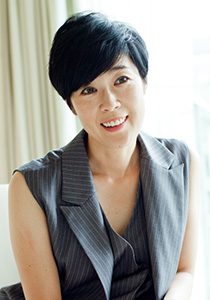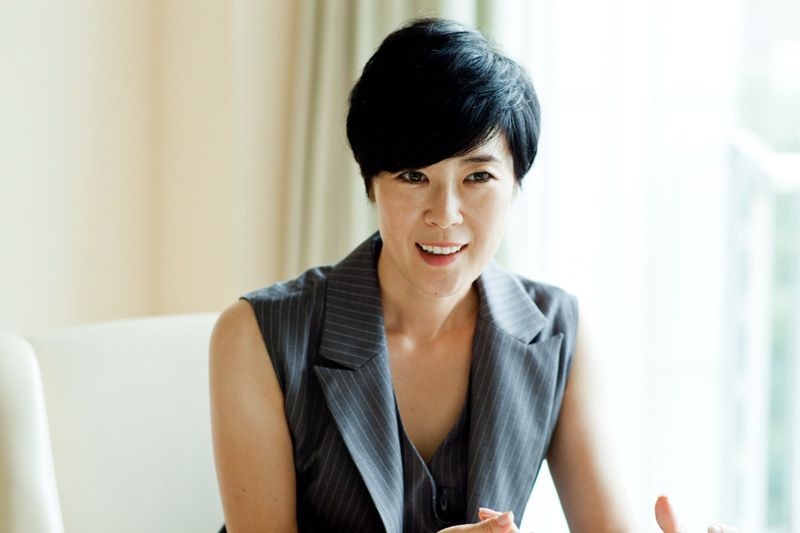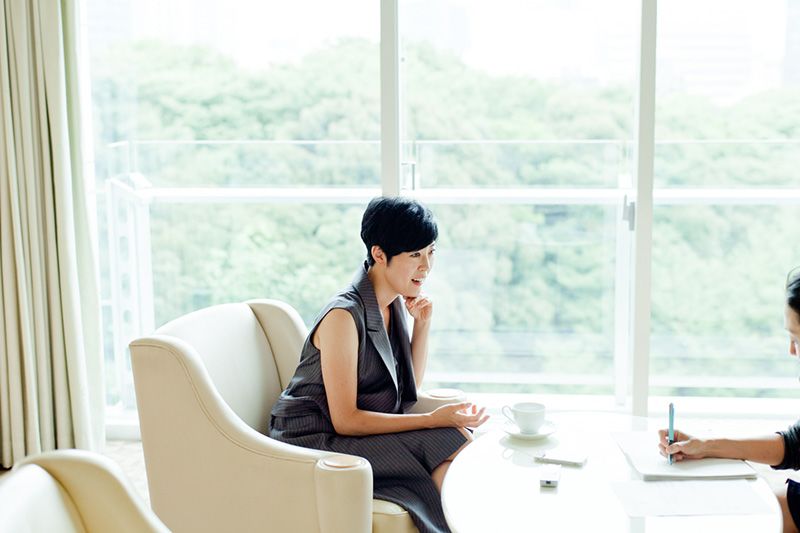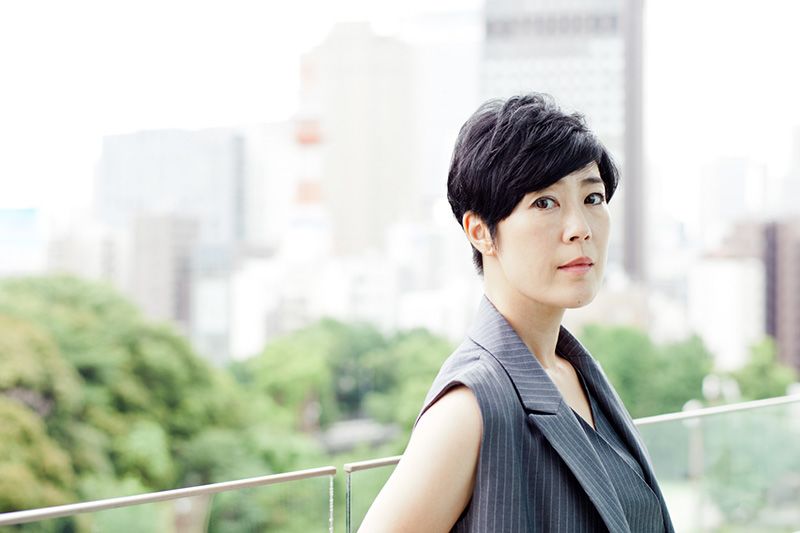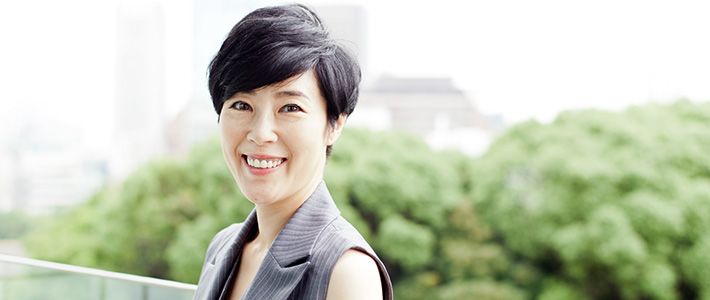
Her Strength Is No Act: An Interview with Actress Terajima Shinobu
Culture- English
- 日本語
- 简体字
- 繁體字
- Français
- Español
- العربية
- Русский
INTERVIEWER Did your outlook change at all when you became the first Japanese actress in 35 years to win the Silver Bear for Best Actress at the 2010 Berlin International Film Festival?
TERAJIMA SHINOBU I don’t feel like I’ve changed personally—perhaps because throughout my career I’ve always been lucky enough to be cast in roles that interest me. I got to appear in the films Akame 48 Waterfalls and Vibrator, for which I won acting awards in Japan, and then I had the chance to work with director Wakamatsu Kōji on the film Caterpillar, a role for which I received the Silver Bear. So I’ve been very fortunate. I suppose it’s true that the way I’m perceived around the world has changed since winning that award—I suddenly began to receive calls from overseas directors. But although there’s been a lot of talk about future projects with them, nothing concrete has come of it yet.
Projects that Didn’t Pan Out
INTERVIEWER Have you been in contact with any famous directors?
TERAJIMA When I’m in France, there are lots of opportunities to meet directors, and they all talk enthusiastically about potential projects. But if you happen to express interest, nothing ever comes of it, despite all the grand talk. That’s how it seems to go in Europe. There was one time, though, when I really felt I’d come across an ideal project. The producer behind [the legendary 1974 French erotic film] Emmanuelle had a script lined up for a new movie and wanted me in it. But in the end, the project was abandoned when the funding didn’t come together. It was a real pity, especially because the planned film was a comedy. I never get offered comedic roles in Japan, so I was really looking forward to a fresh challenge. The script was all in French, too, so I studied hard.
I did recently work with a young, enthusiastic French director named Kristof Sagna on his short film Savage Night. But that’s my only experience so far of working on a foreign film that was actually completed.
The World Outside Hollywood
INTERVIEWER A lot of people in the film industry, even in Japan, dream of making it in Hollywood someday, but that doesn’t seem to be your goal.
TERAJIMA I’ve never really been interested in American movies. Even as a high school student, I only ever went to art house cinemas. Rather than simple stories with a nice, happy ending, I’ve always preferred more ambiguous films that give you something to think about. Of course, I’m always interested in a good script, but I don’t think there’s any point in appearing in a Hollywood film just for the sake of it, even in a small role—unless you can rise to the level of an actor like Watanabe Ken, which is fantastic. The Academy Awards may be seen as the pinnacle of world cinema, but not for me. My stance has always been that if an interesting project comes along that really needs me in a certain role, then I want to be involved—regardless of which country it’s from.
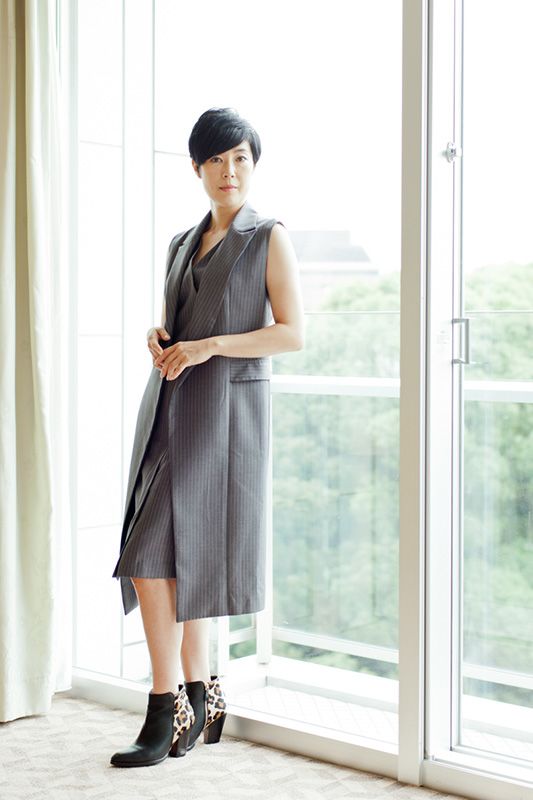 INTERVIEWER From Caterpillar to Vibrator and The Millennial Rapture, you’ve taken on a lot of unique and unusual roles. In Caterpillar, for instance, you gave a powerful performance as a woman whose marital life is turned upside down as a result of her husband’s wartime experiences and wounds. You’ve also played Japanese characters from a range of historical periods. From the perspective of your acting experience, how do you see Japan today?
INTERVIEWER From Caterpillar to Vibrator and The Millennial Rapture, you’ve taken on a lot of unique and unusual roles. In Caterpillar, for instance, you gave a powerful performance as a woman whose marital life is turned upside down as a result of her husband’s wartime experiences and wounds. You’ve also played Japanese characters from a range of historical periods. From the perspective of your acting experience, how do you see Japan today?
TERAJIMA I think films are an important way to introduce Japanese culture to overseas audiences. If Korean, Chinese, and Japanese actors are going to find themselves cast in the same sorts of roles in overseas productions, then I would prefer to be accepted by the world for appearing in Japanese films. That’s how it was in the era of great Japanese directors like Kurosawa Akira and Mizoguchi Kenji. These days, if someone asks you about the current state of Japanese cinema, it’s extremely hard to explain. There’s a lot of money in Chinese movies, so they can make big epics. And Korean cinema is known for gritty human dramas. So what’s the defining trait of Japanese films? I suppose you could say that the quiet understatement captured in the work of Ozu Yasujirō reflects the past virtues of Japan. And I was pleased to see that a director with a similarly understated style, Koreeda Hirokazu, has recently won awards for his work. I’d like to work with someone like Kawase Naomi—a Japanese director who has won worldwide acclaim.
Wanted: Directors Who Cast Real Women
INTERVIEWER Japanese films don’t often become global hits in part because their themes can be quite personal and autobiographical, dealing with small-scale issues.
TERAJIMA As a Japanese actress, I’ve thought a lot about how to broaden the appeal of our cinema. But unfortunately, most of the scripts that come along feature main characters in their twenties.
INTERVIEWER There used to be a lot of older leading actresses.
TERAJIMA In Europe it doesn’t matter how old you are because there are scripts for all ages. I often wonder why that doesn’t seem possible in Japan anymore. The market focuses overwhelmingly on filmgoers in their twenties. Also, not many directors these days want to focus on women in their films, so there are fewer and fewer starring roles for women. The director Naruse Mikio always wanted women to be at the center of his films, and Itami Jūzō was the same. Caterpillar is a film that very much centers on the main female character, which is why I decided to take the role. I thought the film would give me a chance to show the world the strength of Japanese women in a variety of ways.
Perhaps due to their shyness, a lot of directors don’t seem interested in using real actresses, although they have few hesitations about casting ditzy airheads. Since working with Hiroki Ryūichi on his film Vibrator, I haven’t encountered another director able to capture the darker side of a female character in a way that reveals just how much they adore women—apart from Wakamatsu Kōji, who was in a league of his own. Even when you come across a screenplay for a film with a female lead, in most cases the story turns out to be rather flimsy. Of course, even in that case, it’s the job of an actress to make up for such weaknesses through her performance, I suppose.
INTERVIEWER The crisis in Japanese cinema that you describe has been going on for some time now. Can the situation be changed?
TERAJIMA I really want to place my hopes in the younger generation of directors. That’s why I try to make a point of watching every new Japanese film that comes out. One up-and-coming director is Sakamoto Ayumi, whose Forma won the Japanese Cinema Splash Best Picture Award at the 2013 Tokyo International Film Festival. Although in appearance she looks like any other young Japanese woman, her films convey a dark, murky sort of atmosphere. She brings out so many different aspects of what it is to be human, and it was striking to realize that there are directors like her out there.
Most actors just take whatever parts come their way, but it’s important to make the effort to find people you want to work with and reach out to them. I want to challenge the conventional approach for the sake of Japanese cinema as well as Japanese culture in general.
Marriage Broadens Her Outlook
INTERVIEWER How much of an influence has your marriage to Laurent Ghnassia had on your career?
TERAJIMA It has definitely broadened my horizons. From the start he knew so much more than me about artists and directors. And he has introduced me to all sorts of people that he has come into contact with through his work for FID Marseille, Marseille’s international film festival.
INTERVIEWER Have you become more internationally minded?
TERAJIMA Stepping onto the global stage was never something that I yearned for, and even now that I’m on that stage, I don’t really feel like I’ve somehow moved up to a higher level. I’ve always had plenty of chances to encounter people from over the world, so the country someone’s from makes little difference to me. And I work in a profession where you have to maintain your composure no matter who you are working with or what country they come from.
INTERVIEWER Was there a cultural gap between you and your husband at first?
TERAJIMA Yes, of course. I’m from a traditional Japanese family. Although I was already fond of my country, since getting together with Laurent, I’ve developed an even deeper appreciation for Japan. Hearing so much international news from Laurent has made me realize how little I knew about what was going on in the world before we got married. I’m often struck by how tranquil Japan seems when you think about everything that’s happening elsewhere. So I do feel my eyes have been opened to the wider world, but I still have a lot to learn.
INTERVIEWER What language do you speak at home?
TERAJIMA We speak English, although I’m always working on my French. I learn a lot from listening to Laurent speak French to our son. And his Japanese has really improved from my using the language with him.
Speaking Her Mind (in French)
INTERVIEWER You recently appeared in your first French film, Savage Night.
TERAJIMA My lines were in Japanese, but I had to communicate with both the director and producer in French. Luckily, it was the kind of environment where I had the freedom to say what I wanted. On a Japanese film set, everything is so systematic and precise that you don’t really have the chance to complain. Plus, there is no custom in Japan of making a direct complaint to someone. The crew on that French film was relatively inexperienced, and one day I had a disagreement with the director because he wanted to cut a scene I thought was really important. He said that “the scene just wasn’t working,” but I responded by saying: “It’s up to the actor to make it work. That’s what you need to understand.”
INTERVIEWER And all this was in French?
TERAJIMA That’s right. I surprised myself. Even in French, the words come more easily when you’re angry or speaking from the heart. It made me realize that I could cope in a French-language environment, so that was gratifying.
INTERVIEWER It sounds like there’s a lot to look forward to and that you’re always developing.
TERAJIMA Since getting married, the idea of playing a European character no longer seems so daunting. Before, it would have seemed bizarre for me to put on a blonde wig and try a character with a foreign name. But after spending so much time with Laurent, even my gestures have taken on some “foreign” characteristics. My hair color may still be typically Japanese, but I’m totally accustomed to foreigners now. So I feel that my international marriage has had a much more positive impact on my work than I ever expected.
Parenthood Brings a New Outlook
INTERVIEWER As the daughter of a kabuki actor and a famous actress, wasn’t there an expectation that you would find a Japanese husband?
TERAJIMA Not at all. I’m sure my parents did worry about my choice of partner, but once Laurent visited to formally introduce himself, they immediately gave their consent. But even if I had taken a Japanese husband, no matter what family I married into I think I would still have remained a Terajima.
There are so many things that are second nature to any Japanese, but that Laurent just has no experience of. So even when he slips up, my parents give him the benefit of the doubt. And even if they do get a bit annoyed now and then, they take the time to explain Japanese customs. At the end of the day, my marriage has been a really positive experience.
INTERVIEWER Has married life changed your relationship with your family at all?
TERAJIMA My parents have always given me the chance to do what I wanted. But my brother tended to get more attention since from the moment he was born he was destined to be a kabuki actor, following in the Terajima family tradition. They say they brought us up in a spirit of equality, but I do feel like he got a lot more love and attention. Since becoming a mother myself, though, I’ve come to understand a lot better the difference between the way parents and children see the world. When my son sees me doing my makeup for example, he seems to sense that I’m about to go somewhere. Thinking about the almost animal-like ability of children to pick up on things like that, I realize that I developed a lot of complexes as I grew up, although I’ve forgotten most of them by now.
INTERVIEWER What kind of complexes?
TERAJIMA Ever since I was a child, I had a burning desire to show my parents that I can be independent and stand on my own two feet as an actress. But now I’m lot more relaxed about things. And since I have my own family now, with Laurent and our son, I can communicate with my parents from that standpoint, which is a really comfortable feeling.
INTERVIEWER In what way?
TERAJIMA Well, from the viewpoint of parents, their children are always their children. But now that I’m a mother, I get along a lot better with my mother and father because we can talk on an equal footing as parents. They are also overjoyed to see how much my son likes kabuki. Of course, my nephew has no choice but to follow his father into that profession, but I think it’s fine for my son to try it out for himself while he has that interest.
Equality Is Up to Women
INTERVIEWER Finally, what are your thoughts on the situation for women in Japan and the recent efforts to introduce policies to promote gender equality?
TERAJIMA At least on the surface of things, men have had a stronger positon in Japanese society due to gender inequality. But women need to stand up for themselves. For instance, if a woman is subjected to sexist heckling [as in the recent case in the Tokyo assembly], she should fight back by confronting the person who made the comment rather than feeling sorry for herself or asking for an apology. I don’t think the situation for women will improve much until we see more women display that sort of strength.
(Based on an interview conducted on July 18, 2014, by Yata Vattani Yumiko. Photographs by Igarashi Kazuharu; styling by Abe Natsuko [KiKi Inc.]; hair and makeup by Matsui Rika [A.K.A.]; all clothing courtesy of Enfold.)
